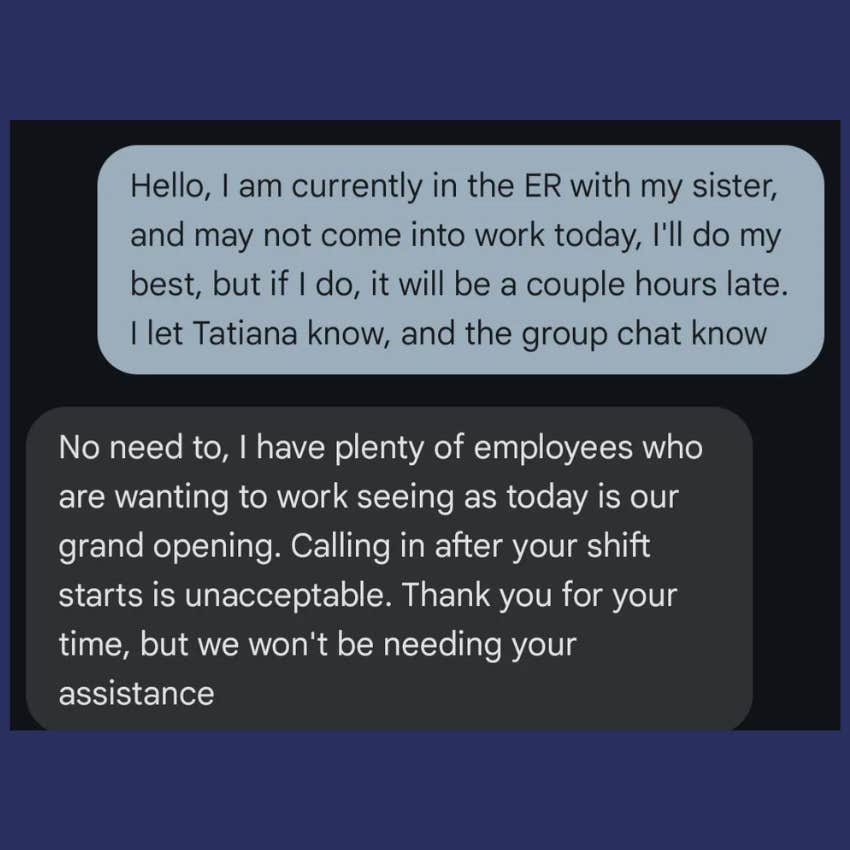Worker Asks For Advice After Getting Cryptic Text Message From His Boss That Isn't Clear If He's Being Fired Or Not
How he handles the ambiguity may make all the difference.
 Kateryna Onyshchuk | Shutterstock
Kateryna Onyshchuk | Shutterstock If there's one thing that's endemic to the workplace, no matter the job or industry, it's unclear communication. Whether it's bizarre corporate jargon or passive-aggressive tip-toeing, reading between the lines is an essential skill for pretty much every job.
But what many don't realize is that lack of clarity can sometimes be used for nefarious purposes. One worker on Reddit is getting a crash course in this, in a situation with his boss, which is the perfect combination of wildly insensitive and potentially devious.
The worker is unsure if he's being fired or not after receiving a cryptic text from his boss.
Unless you're highly skilled in the art of mind-reading, it can often seem like nobody at work is ever saying what they mean. Granted, sometimes you SHOULDN'T say what you mean — "per my last email" is going to keep you a lot safer than, "Maybe if you read my previous email, you wouldn't be confused, genius."
But most of the time, this lack of clarity is silly, annoying, time-wasting, disrespectful — and, in this Redditor's case, both insensitive and likely dishonest.
 Ground Picture | Shutterstock
Ground Picture | Shutterstock
The worker was reprimanded for being with his sister in the emergency room in a way that seemed to threaten his job.
Right off the bat, this situation is egregious. The worker shared in his Reddit post that he was experiencing a family emergency and was forced to call out of his shift via a text to his manager.
"Hello, I am currently in the ER with my sister, and may not come into work today," he wrote. "I'll do my best, but if I do, it will be a couple hours late."
 Reddit
Reddit
The worker added that he'd also notified another member of management, as well as the rest of the staff, about the situation so that everyone was in the loop.
His boss responded, "No need to." Whether he was referring to notifying the staff or trying to make it into his shift later is entirely unclear, but either way, it's an insensitively terse opening. And then it got worse.
"I have plenty of employees who are wanting to work seeing as today is our grand opening," the boss continued. "Calling in after your shift starts is unacceptable. Thank you for your time, but we won't be needing your assistance."
Reprimanding someone for being with their sister in the hospital is bad enough. But the aggressive implications are on a whole other level. It left the worker asking his fellow Redditors, "Did I just get fired?" and wondering if he should go to his next scheduled shift on Friday.
People urged the worker to proceed as if he still had the job because unclear communication like this is often purposeful.
The most reasonable interpretation of this cryptic text is that, yes, this worker has been fired (and for an utterly ridiculous reason at that). But his boss didn't actually come out and say so, right? And that's almost more important than the firing itself.
As the aptly named work issues X account "[Eff] You I Quit" put it, "unless this toxic manager makes it crystal clear that you are fired, then it's safe to assume you still have the job. Show up and make them fire you. In writing."
Sure, it gives you a satisfying way to sort of pettily retaliate. But it also can sometimes save you from potentially difficult and costly drama. As another X user put it, "[this manager is] banking on them to take it as being fired so they'll stop showing up," which the manager will then use as justification for terminating them.
Getting your termination in writing removes any perception that you quit — which could hinder your access to benefits like unemployment. But employment lawyers say it also establishes two vitally important details: when you were fired and, in some cases, why.
The "why," of course, helps determine whether the firing is legal and whether you're eligible to file a lawsuit if it's not. And the "when" establishes the point at which the clock started running on your timeframe for filing such a suit.
Lawyers say not having these details on paper gives your employer leeway to misrepresent what happened and tank your claim.
So don't ever stand for this kind of ambiguity. You're owed clarity — and it just might make things a lot easier if your employer does actually cut you loose.
John Sundholm is a news and entertainment writer who covers pop culture, social justice and human interest topics.

